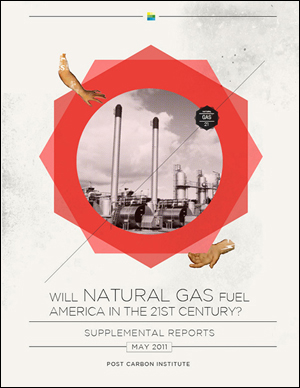
Natural Gas Report Supplements: Public Health, Agriculture, Transportation
Anthony Perl Brian Schwartz Cindy Parker Michael Bomford Richard Gilbert
June 1, 2011
These articles are supplements to Will Natural Gas Fuel America in the 21st Century? (2013). They consider how the challenges posed by shale gas production have serious implications for the future of agriculture, transportation, and health in the United States.
Summary
Agriculture and Natural Gas
By Michael Bomford
The vast majority of natural gas supporting American agriculture today is used to manufacture farm inputs like pesticides, plastics, and fertilizers — and nitrogen fertilizer production in turn accounts for most of that. Moreover, synthetic fertilizer used in the U.S. is increasingly imported, further increasing our dependence on gas from foreign and unconventional (i.e., shale gas) resources. These constraints underline the need for a stronger push towards organic agriculture and other fossil fuel free food system solutions.
Problems and Opportunities with Natural Gas as a Transportation Fuel
By Richard Gilbert and Anthony Perl
Despite the hype to the contrary, natural gas should have only a modest role in fueling future mobility. And the best use of this limited fuel is not to burn it directly in internal combustion engines, but rather to generate electricity (while also generating heat in efficient cogeneration arrangements) to power a 21st century electrified transportation system.
Public Health Concerns of Shale Gas Production
By Brian Schwartz, MD and Cindy Parker, MD
With so many existing and projected shale gas wells expected to remain in operation for years and thus leave a legacy of contaminated air, soil, and water, the long-term and cumulative effects over space and time converge to raise the public health concerns to a high level. The EPA and public health scientists need to better evaluate the risks, and determine how best to regulate shale gas production to avoid another legacy — as happened with coal — affecting the health and well-being of millions of people for generations.
